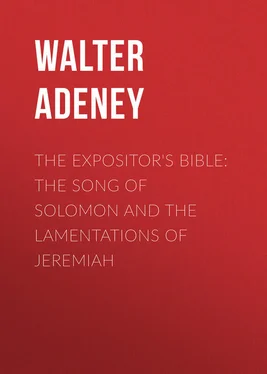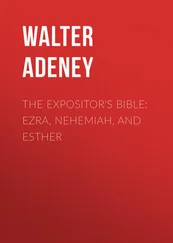Walter Adeney - The Expositor's Bible - The Song of Solomon and the Lamentations of Jeremiah
Здесь есть возможность читать онлайн «Walter Adeney - The Expositor's Bible - The Song of Solomon and the Lamentations of Jeremiah» — ознакомительный отрывок электронной книги совершенно бесплатно, а после прочтения отрывка купить полную версию. В некоторых случаях можно слушать аудио, скачать через торрент в формате fb2 и присутствует краткое содержание. Издательство: Иностранный паблик, Жанр: foreign_religion, foreign_antique, foreign_prose, на английском языке. Описание произведения, (предисловие) а так же отзывы посетителей доступны на портале библиотеки ЛибКат.
- Название:The Expositor's Bible: The Song of Solomon and the Lamentations of Jeremiah
- Автор:
- Издательство:Иностранный паблик
- Жанр:
- Год:неизвестен
- ISBN:нет данных
- Рейтинг книги:3 / 5. Голосов: 1
-
Избранное:Добавить в избранное
- Отзывы:
-
Ваша оценка:
- 60
- 1
- 2
- 3
- 4
- 5
The Expositor's Bible: The Song of Solomon and the Lamentations of Jeremiah: краткое содержание, описание и аннотация
Предлагаем к чтению аннотацию, описание, краткое содержание или предисловие (зависит от того, что написал сам автор книги «The Expositor's Bible: The Song of Solomon and the Lamentations of Jeremiah»). Если вы не нашли необходимую информацию о книге — напишите в комментариях, мы постараемся отыскать её.
The Expositor's Bible: The Song of Solomon and the Lamentations of Jeremiah — читать онлайн ознакомительный отрывок
Ниже представлен текст книги, разбитый по страницам. Система сохранения места последней прочитанной страницы, позволяет с удобством читать онлайн бесплатно книгу «The Expositor's Bible: The Song of Solomon and the Lamentations of Jeremiah», без необходимости каждый раз заново искать на чём Вы остановились. Поставьте закладку, и сможете в любой момент перейти на страницу, на которой закончили чтение.
Интервал:
Закладка:
THE LAMENTATIONS OF JEREMIAH
CHAPTER I
HEBREW ELEGIES
The book which is known by the title "The Lamentations of Jeremiah" is a collection of five separate poems, very similar in style, and all treating of the same subject – the desolation of Jerusalem and the sufferings of the Jews after the overthrow of their city by Nebuchadnezzar. In our English Bible it is placed among the prophetical works of the Old Testament, standing next to the acknowledged writings of the man whose name it bears. This arrangement follows the order in the Septuagint, from which it was accepted by Josephus and the Christian Fathers. And yet the natural place for such a book would seem to be in association with the Psalms and other poetical compositions of a kindred character. So thought the Rabbis who compiled the Jewish canon. In the Hebrew Bible the Book of Lamentations is assigned to the third collection, that designated Hagiographa , not to the part known as the Prophets .
In form as well as in substance this book is a remarkable specimen of a specific order of poetry. The difficulty of recovering the original pronunciation of the language has left our conception of Hebrew metres in a state of obscurity. It has been generally supposed that the rhythm was more of sight than of sound, but that it consisted essentially in neither, depending mainly on the balance of ideas. The metre, it has been stated, might strike the eye in the external aspect of the sentences; it was designed much more to charm the mind by the harmony and music of the thoughts. But while these general principles are still acknowledged, some further progress has been made in the examination of the structure of the verses, with the result that both more regularity of law and more variety of metre have been discovered. The elegy in particular is found to be shaped on special lines of its own. It has been pointed out that a peculiar metre is reserved for poems of mournful reflection.
The first feature of this metre to be noted is the unusual length of the line. In Hebrew poetry, according to the generally accepted pronunciation, the lines vary from about six syllables to about twelve. In the elegy the line most frequently runs to the extreme limit, and so acquires a slow, solemn movement.
A second feature of elegiac poetry is the breaking of the lengthy line into two unequal parts – the first part being about as long as a whole line in an average Hebrew lyric, and the second much shorter, reading like another line abbreviated, and seeming to suggest that the weary thought is waking up and hurrying to its conclusion. Sometimes this short section is a thin echo of the fuller conception that precedes, sometimes the completion of that conception. In the English version, of course, the effect is frequently lost; still occasionally it is very marked, even after passing through this foreign medium. Take, for example, the lines,
"Her princes are become like harts – that find no pasture,
And they are gone without strength – before the pursuer;" 87 87 i. 6.
or again the very long line,
"It is of the Lord's mercies that we are not consumed – because His compassions fail not." 88 88 iii. 22.
Now although this is only a structural feature it points to inferences of deeper significance. It shews that the Hebrew poets paid special attention to the elegy as a species of verse to be treated apart, and therefore that they attached a peculiar significance to the ideas and feelings it expresses. The ease with which the transition to the elegiac form of verse is made whenever an occasion for using it occurs is a hint that this must have been familiar to the Jews. Possibly it was in common use at funerals in the dirge. We meet with an early specimen of this verse in Amos, when, just after announcing that he is about to utter a lamentation over the house of Israel, the herdsman of Tekoa breaks into elegiacs with the words,
"The virgin daughter of Israel is fallen – she shall no more rise:
She is cast down upon her land – there is none to raise her up." 89 89 Amos v. 2.
Similarly constructed elegiac pieces are scattered over the Old Testament scriptures from the eighth century B.C. onwards. Several illustrations of this peculiar kind of metre are to be found in the Psalms. It is employed ironically with terrible effect in the Book of Isaiah, where the mock lament over the death of the king of Babylon is constructed in the form of a true elegy. When the prophet made a sudden transition from his normal style to sombre funereal measures his purpose would be at once recognised, for his words would sound like the tolling bell and the muffled drums that announce the march of death; and yet it would be known that this solemn pomp was not really a demonstration of mourning or a symbol of respect, but only the pageantry of scorn and hatred and vengeance. The sarcasm would strike home with the more force since it fell on men's ears in the heavy, lingering lines of the elegy, as the exultant patriot exclaimed,
"How hath the oppressor ceased – the golden city ceased!
The Lord hath broken the staff of the wicked – the sceptre of the rulers," etc. 90 90 Isa. xiv. 4 ff.
A special characteristic of the five elegies that make up the Book of Lamentations is their alphabetical arrangement. Each elegy consists of twenty-two verses, the same number as that of the letters in the Hebrew alphabet. All but the last are acrostics, the initial letter of each verse following the order of the alphabet. In the third elegy every line in the verse begins with the same letter. According to another way of reckoning, this poem consists of sixty-six verses arranged in triplets, each of which not only follows the order of the alphabet with its first letter, but also has this initial letter repeated at the beginning of each of its three verses. Alphabetical acrostics are not unknown elsewhere in the Old Testament; there are several instances of them in the Psalms. 91 91 E.g. , Psalms ix., x., xxv., xxxiv., xxxvii., cxix., cxlv.
The method is generally thought to have been adopted as an expedient to assist the memory. Clearly it is a somewhat artificial arrangement, cramping the imagination of the poet; and it is regarded by some as a sign of literary decadence. Whatever view we may take of it from the standpoint of purely artistic criticism, we can derive one important conclusion concerning the mental attitude of the writer from a consideration of the elaborate structure of the verse. Although this poetry is evidently inspired by deep emotion – emotion so profound that it cannot even be restrained by the stiffest vesture – still the author is quite self-possessed: he is not at all over-mastered by his feelings; what he says is the outcome of deliberation and reflection.
Passing from the form to the substance of the elegy, our attention is arrested on the threshold of the more serious enquiry by another link of connection between the two. In accordance with a custom of which we have other instances in the Hebrew Bible, the first word in the text is taken as the title of the book. The haphazard name is more appropriate in this case than it sometimes proves to be, for the first word of the first chapter – the original Hebrew for which is the Jewish title of the book – is "How." Now this is a characteristic word for the commencement of an elegy. Three out of the five elegies in Lamentations begin with it; so does the mock elegy in Isaiah. Moreover, it is not only suggestive of the form of a certain kind of poetry; it is a hint of the spirit in which that poetry is conceived; it strikes the key-note for all that follows. Therefore it may not be superfluous for us to consider the significance of this little word in the present connection.
Читать дальшеИнтервал:
Закладка:
Похожие книги на «The Expositor's Bible: The Song of Solomon and the Lamentations of Jeremiah»
Представляем Вашему вниманию похожие книги на «The Expositor's Bible: The Song of Solomon and the Lamentations of Jeremiah» списком для выбора. Мы отобрали схожую по названию и смыслу литературу в надежде предоставить читателям больше вариантов отыскать новые, интересные, ещё непрочитанные произведения.
Обсуждение, отзывы о книге «The Expositor's Bible: The Song of Solomon and the Lamentations of Jeremiah» и просто собственные мнения читателей. Оставьте ваши комментарии, напишите, что Вы думаете о произведении, его смысле или главных героях. Укажите что конкретно понравилось, а что нет, и почему Вы так считаете.












